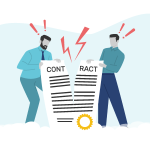Should I cancel my professional insurance?
November 7, 2024

Picture this: after months, maybe even years of waiting, you’ve finally done it. You’ve FINALLY cancelled your insurance policy! Maybe you’re going on a leave of absence. Or retiring. Maybe you’ve closed down your business, or even changed professions. Or maybe you bought it to work with a specific client and now the contract’s complete. Whatever the reason, you can say goodbye to those pesky premiums and constant renewal reminders.

Then, a few days later, you get a call: you’re being sued by an old client. Now what? Your old policy should cover you right? Guess again. Cancelling your policy, or letting it expire, can create gaps in coverage that leave you unprotected. Without an active policy in place, you’ll be 100% on your own if there’s a claim.
While Professional Liability Insurance is mandated in highly regulated industries, it’s not a working requirement for all professionals. As a result, you may choose to cancel your coverage or let your policy lapse, or expire, if you feel you no longer have a need for it. Before you take the leap, here’s why you should think twice before cancelling or non-renewing coverage and how you can avoid gaps in protection.
Gaps in Coverage:
What’s a gap in coverage?
A gap or lapse in coverage occurs when there’s a period between your insurance policies, specifically, the time between when one policy ends and when your new policy takes effect. For example, say you had a policy from January 1, 2022 to January 1, 2023, and then cancelled your coverage and didn’t purchase a new policy until January 1, 2024. The entire 2023 year would count as a gap in coverage.
Aside from cancellation, gaps in coverage can occur if you’ve failed to renew your policy on time and allowed it to expire or lapse, missed a payment, or switched providers. In contrast, maintaining your coverage without interruption is known as continuous coverage. Whether you have insurance for your business, or yourself as a working professional, it’s always better to have continuous coverage than gaps in your protection that could leave you exposed.
Why should I avoid gaps in coverage?
A gap in coverage could result in no coverage at all. Why? Many types of insurance, like Professional Liability, Directors & Officers (D&O), and even Cyber Insurance, operate on a “claims-made and reported basis.” That means your policy will only apply to claims that are both brought to light, or “made,” against you AND “reported” to the insurance company during the policy term. Claims must be reported while the policy is in place, so you need to have continuous coverage from the moment an allegation occurs until it’s reported.
In other words, claims that arise after your policy ends won’t be covered—even if you had insurance when the alleged incident occurred. Here’s an example: if you cancelled or let your policy lapse on January 1, 2023, and a claim was made against you after that date for something that occurred before January 1, your old, now expired policy wouldn’t cover you.
Why is this important? You can be sued for past work YEARS later, long after the event giving rise to the claim has taken place. But if you don’t have insurance when the claim is reported, you’ll have to pay for the legal costs, settlements, and any damages out-of-pocket. This is a huge risk if for anyone that’s:
- Going on a leave of absence (parental, maternity, short-term or long-term disability, etc.);
- Retiring;
- Closing down their business;
- Regularly cancelling and repurchasing insurance for short-term contracts;
- Switching insurance companies;
- Forgotten to renew their insurance and/or allowed it to lapse.
RELATED: The 8 Most Frequently Asked Questions About Professional Liability Insurance
How do I avoid gaps in coverage?
You can avoid gaps and maintain continuous coverage in one of two ways:
1. Regularly renew your policy without interruption.
Whether you practice full-time or part-time, maintaining Professional Liability Insurance is essential for protection against claims of errors, omissions, or negligence. Keep coverage active as long as you’re working—even if it’s not required by law—and always renew well before your policy expires.
2. Obtain an extended reporting period.
An extended reporting period (ERP), also known as a discovery period, tail coverage, or run-off coverage, allows you to report any claims that occurred while your policy was still in force for a specified period of time following cancellation or non-renewal. If a past claim arises and it’s reported during your ERP, your coverage will still apply.
ERPs are ideal if you’re looking to cancel or not renew your insurance policy for any reason. That way, you’ll still have coverage for any claims related to your previous work even after you’ve stopped practising.
RELATED: Do you REALLY need Professional Liability Insurance?
Extended Reporting Periods:
Can an ERP replace my Professional Liability Insurance policy?
To be clear, an ERP isn’t a substitute for Professional Liability Insurance altogether. It simply extends the reporting time for your past work once your policy is no longer active; it doesn’t cover any new incidents that take place after your policy ends. This is a common mistake: many professionals continue to work part-time after retiring or going on leave and assume an ERP will protect them if there’s a claim.
To illustrate: if you had a Professional Liability Insurance policy between January 1, 2021 and January 1, 2022, and then purchased a one-year ERP to cover a leave of absence, you would only be protected for claims relating to your work during the initial policy period: January 1, 2021 to January 1, 2022. But with an ERP, you would still be able to report those claims until January 1, 2023.
If you resumed operations at any point after January 1, 2023, any new claims arising after January 1, 2022 wouldn’t be covered under your previous policy or ERP; you would need a new Professional Liability Insurance policy for your work going forward. But keep in mind: a new policy will only apply to work that occurs after the policy takes effect—it won’t provide coverage for past work.
RELATED: Professional Liability Insurance: What is it, What’s Covered, and What’s Not?
How long should my ERP be?
The length of your ERP depends on several factors, like your industry, the potential risks involved, how long you plan to be inactive, and more. In some situations, like maternity leave, a one or two-year ERP may be enough, while others might need extended coverage for multiple years, especially in fields where claims can arise long after services are rendered.
We generally recommend selecting an ERP that lasts at least 6 years after you stop practising. However, it’s wise to check the statute of limitations for legal malpractice claims in your field and region, then opt for the longest applicable period. This way, you’ll have coverage for any potential claims that might arise within the full legal timeframe.
When should I get an ERP?
We recommend purchasing an ERP if:
1. You have any existing or expired contracts with current or past clients that require insurance.
In many industries, like consulting, staffing, or engineering, you might be required by clients to maintain Professional Liability, D&O, or Cyber Insurance during your contract and for a period of time after the contract ends. Without proof of coverage, some companies won’t even consider doing business with you, even if you’re a part-time practitioner or a subcontractor. As a result, you might consider purchasing a policy to fulfill client needs and terminating your coverage once the contract is complete. With an ERP, you won’t be left unprotected if a claim from a past contract or project is reported later on.
2. You cease practice or close your business.
Whether you’re planning to take a leave of absence, switch careers, retire, or step away from work for any reason, an ERP still lets you cancel your policy without losing coverage on past work. Once you’re fully inactive, though, you’ll want to avoid providing any further professional services, as they won’t be protected.
3. It’s a regulatory requirement for your profession.
In some industries, you might be obligated to maintain an active Professional Liability Insurance policy or an extended reporting period for a period of time after you cease practice. Be sure to consult with the regulatory authorities in your jurisdiction on the requirements and how long your ERP should be.
4. Your business has a change in control.
If you have your own business or practice, your policy may be automatically cancelled following a sale or change in ownership or assets. Insurers typically do this to conduct a thorough assessment of the new owners and evaluate any changes that may impact the business going forward.
An ERP protects your business during this transitional period: the previous directors, officers, and other business leaders will remain protected from allegations arising during their tenure, while the new owners will be shielded from claims related to actions or decisions they weren’t part of. Without an ERP, everyone involved is vulnerable if a claim is reported after the change in control.
Decisions, Decisions:
Can’t I just buy a new policy when I need it?
You can’t always rely on buying a new policy when you need it. While cancelling may offer a short-term cost break, the long-term risks and extra costs often outweigh the savings. Here’s why:
- No Coverage for Past Work: Remember, a new policy will only cover claims and incidents that are made and reported after the policy’s start date. Unless you purchase coverage for prior acts—which isn’t always available—you’ll be exposed.
- Potential Fees: If you cancel mid-term just because a client contract ended, there could be a penalty.
- Re-Application Hassles: It can be time-consuming and costly to find the right coverage again, particularly if you’re in a specialized industry. Plus, insurers may charge higher premiums if they see a pattern of cancellations.
- Risk of Declines: Frequent cancellations and re-applications can make it harder to even qualify for insurance later on. Insurers tend to look unfavourably on clients that have cancelled multiple times, which could lead to declines on future applications.
How do I know if my policy is claims-made or not?
Check your insurance policy or certificate. There will be a section that outlines whether or not the policy is claims-made, what the terms are, and how soon you should report incidents to your insurance company (e.g. anytime during the policy period, as soon as possible, or within 30-60 days, etc.). If you aren’t sure, or have any questions, consult with your broker to confirm and determine best practices.
What if my policy is occurrence-based?
Occurrence-based policies cover you for any incidents that take place during your policy period, regardless of when a claim is brought against you. Unlike claims-made and reported policies, there’s no time limit to the reporting period.
As a result, occurrence-based policies don’t require an ERP; if you cancel your insurance and file a claim years later, coverage is still available, as long as you had insurance when the event giving rise to the claim occurred.
Commercial General Liability Insurance is usually occurrence-based, while Professional Liability, Directors & Officers, and Cyber Insurance are often claims-made. Certain professions may, however, still require occurrence-based Professional Liability due to the nature of their work.
So what should I do?
If you’re at a crossroads, it’s important that you consider all the factors before cancelling coverage. By maintaining continuous coverage or obtaining an ERP, you can ensure that legal action doesn’t leave you liable out-of-pocket. Plus, ERPs are usually available at a fraction of the price of your expiring policy premium, so they can be a cost-efficient investment in both yourself and your business to provide peace of mind.
We know insurance can be confusing, so be sure to reach out to a broker, like PROLINK, for further guidance, especially if you’re planning to work again in the future. Timing is crucial here: while you can reach out at any time, it’s best to connect well before cancellation or non-renewal. Some insurance companies have a narrow window, often 30 days or less, to purchase an ERP following the policy’s end, while others need to be notified no later than your cancellation date. A broker can help you determine when—and if—you should cancel or non-renew your policy, find the right ERP for your needs, and make the most of your coverage.
Still have questions? Give PROLINK a call. Taking the time to understand your coverage and what it can do for you might make all the difference when it matters most. With over 40 years in the industry, we’ve seen it all. We’ll take the time to listen to your needs and help you make an informed decision so you’re protected no matter what.
PROLINK’s blog posts are general in nature. They do not take into account your personal objectives or financial situation and are not a substitute for professional advice. The specific terms of your policy will always apply. We bear no responsibility for the accuracy, legality, or timeliness of any external content.




